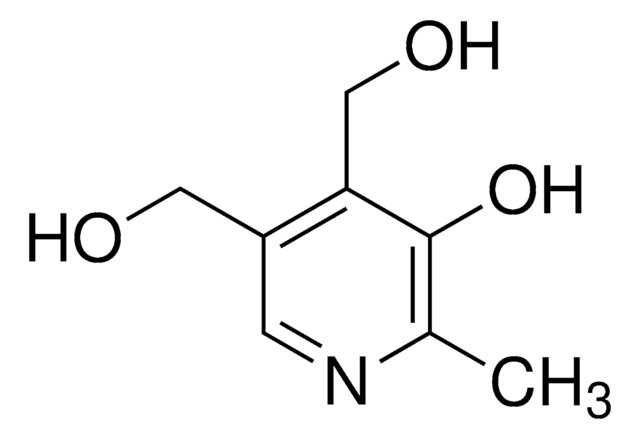T1270
Thiamine hydrochloride
BioReagent, suitable for cell culture, suitable for insect cell culture, suitable for plant cell culture
Synonym(s):
Aneurine hydrochloride, Vitamin B1 hydrochloride
About This Item
Recommended Products
biological source
synthetic (organic)
Quality Level
product line
BioReagent
Assay
≥99.0% (HPLC)
form
powder
mol wt
Mw 337.27 g/mol
technique(s)
cell culture | insect: suitable
cell culture | mammalian: suitable
cell culture | plant: suitable
color
white
mp
250 °C (dec.) (lit.)
solubility
H2O: 50 mg/mL, clear, colorless
application(s)
agriculture
SMILES string
CC1=NC(N)=C(C[N+]2=CSC(CCO)=C2C)C=N1.Cl.[Cl-]
InChI
1S/C12H17N4OS.2ClH/c1-8-11(3-4-17)18-7-16(8)6-10-5-14-9(2)15-12(10)13;;/h5,7,17H,3-4,6H2,1-2H3,(H2,13,14,15);2*1H/q+1;;/p-1
InChI key
DPJRMOMPQZCRJU-UHFFFAOYSA-M
Looking for similar products? Visit Product Comparison Guide
General description
Application
- of the vitamin-concentrated stock solution for the preparation of Hv-Ca medium for culturing Haloferax volcanii
- of the tris-acetate-phosphate (TAP) medium for culturing Chlamydomonas nivalis
- of modified Bold 3N medium for culturing Chlorella minutissima
Biochem/physiol Actions
Signal Word
Warning
Hazard Statements
Precautionary Statements
Hazard Classifications
Eye Irrit. 2
Storage Class Code
11 - Combustible Solids
WGK
WGK 1
Flash Point(F)
Not applicable
Flash Point(C)
Not applicable
Personal Protective Equipment
Choose from one of the most recent versions:
Already Own This Product?
Find documentation for the products that you have recently purchased in the Document Library.
Customers Also Viewed
Articles
How thiamine and other cell culture components affect the performance of serum-free, protein-free cell culture systems used for biomanufacturing heterologous proteins including monoclonal antibodies. The page introduces the in vitro chemistry and biochemistry of thiamine.
Neoplastic cells are highly dependent on the de novo synthesis of nucleotides to maintain sufficient pools to support DNA replication and the production of RNA.
Our team of scientists has experience in all areas of research including Life Science, Material Science, Chemical Synthesis, Chromatography, Analytical and many others.
Contact Technical Service







